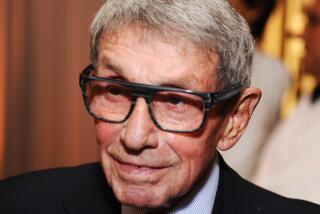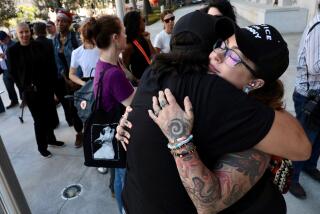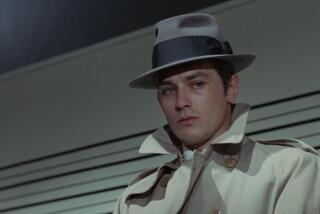From the Archives: Actor William Holden Found Dead at Home
William Holden, whose handsome face and easy, masculine manner made him the quintessential American in many movies, was found dead Monday morning in his apartment in Santa Monica. He was 63.
He apparently died of natural causes, according to the coroner’s office, which will perform an autopsy today. Santa Monica police said Holden was discovered on the floor of his bedroom by his apartment manager and that he may have been dead several days.
According to friends he was preparing to act in “That Championship Season,” a movie version of the Broadway play.
Reagan’s Best Man
The actor was best man at the 1952 wedding of President and Mrs. Reagan and remained friends with them over the years. The President expressed a “great sense of personal loss” upon hearing of Holden’s death.
Holden won an Academy Award for his 1953 role as an American airman in a German prisoner of war camp in “Stalag 17.” He also received Oscar nominations for his parts in “Sunset Boulevard” (1950) and “Network (1976).
He most recently appeared in “S.O.B.,” a movie poking fun at Hollywood that was released earlier this year.
Holden was born William Franklin Beedle Jr. on April 17, 1918, in O’Fallon, Ill. His father, a chemist, moved his family to Pasadena when William Jr. was very young. The boy went to school in Monrovia and South Pasadena and attended Pasadena Junior College.
He acted in several radio plays in college and in 1939 a talent scout got him a small part in the movie “Million Dollar Legs.” At that point he changed his name to Holden, reportedly taking the name of a Los Angeles Times editor with the hope the paper’s critics would not pan his first movie performance too severely.
He need not have worried. The camera like his face and his next role in “Golden Boy” (1939), made him a star. In that film, which was based on a play by Clifford Odets, Holden played Joe Bonaparte, a violinist who becomes a boxer.
“He was handsome, but he looked almost too pretty in that movie,” said Times movie critic Sheila Benson. “He had the kind of face that improved over the years. What he came to represent was integrity, the same thing you get from someone like Henry Fonda.”
A Reassuring Presence
Over the years Holden’s rich but unpretentious voice became as distinctive as his increasingly craggy face. He always brought a reassuring presence to any scene. There was the sense that this polite, no-nonsense man was capable of heroics if the need arose.
Holden made more than 50 movies, including “The Wild Bunch,” “Bridge On the River Kwai” and “Picnic.” He also starred in “The Blue Knight,” a TV movie based on the Joseph Wambaugh novel about a Los Angeles cop.
Grover Lewis, a former journalist who is writing a novel about early Hollywood said, “Holden didn’t get the recognition of stars like Gary Cooper, but you look at the movies he made and you realize that several, especially “Sunset Boulevard” and “The Wild Bunch,” were among the best ever made.”
Lewis once interviewed Sam Peckinpah, director of “The Wild Bunch” a movie about a bunch of misfits in the West at the beginning of the 20th Century who have outlived their time. Peckinpah told Lewis of Holden’s role in a key scene.
“Holden and Ernest Borgnine are sitting by a campfire, passing the bottle,” said Lewis. “Then they begin talking about their plans to give up the outlaw life. Peckinpah said that the whole crew was crying by the time the scene was over. Nobody could have played that role and given it the resonance Holden did.”
It was in “The Bridge On the River Kwai” that Holden most vividly portrayed the American male of the World War II generation.
In that movie, he was a perfect foil to Sir Alec Guinness, who played the very correct British army officer who helped the Japanese build an important bridge in Thailand.
Guinness’ character, crisp and punctilious, always goes by the book. He knows the Geneva Convention by heart. If his Japanese captors want a bridge built, then his men will build it. Holden, tired and sarcastic, doesn’t want to be anyone’s hero. Before he escapes from the prison camp, he spends most of his time figuring out ways to get out of working for the Japanese.
But in the end he does what has to be done, leading an expedition back to the camp to blow up the bridge.
He played a similar hard-bitten character in the role in “Stalag 17” that won him an Oscar. His fellow prisoners dislike him because he is a hustler looking out for himself, but he plays a crucial role in the prison camp escape at the end.
Holden actually served during World War II, although he never saw action. He enlisted in the Army and was graduated a first lieutenant from the Army Air Force Officers Candidate School.
Although he always maintained residences in California, Holden also had houses in Switzerland and in Kenya. He was a conservationist and worked for years to maintain big game habitats on the African continent.
He was not heard from much in the 1960s, when he lived in Switzerland and made several undistinguished films. Then he made a comeback in 1969 with “The Wild Bunch” and was praised for his work in “Network” in 1976.
Holden married actress Brenda Marshall in 1941. They had two children of their own, Peter and Scott, and raised a daughter, Virginia, from Marshall’s previous marriage.
Holden and his wife separated in 1963 and were later divorced. Holden never remarried but in recent years was a close friend of actress Stefanie Powers.
Funeral plans have not been announced.
From the Archives: Gloria Swanson, Queen of Movies’ Golden Years, Dies
From the Archives: Dorothy Chandler, Cultural Leader, Dies
From the Archives: Audrey Hepburn, Actress and Humanitarian, Dies
Ernest Borgnine dies at 95; won Oscar for ‘Marty,’ showed comic side in sitcom
From the Archives: Ella Fitzgerald, Jazz’s First Lady of Song, Dies
More to Read
Start your day right
Sign up for Essential California for the L.A. Times biggest news, features and recommendations in your inbox six days a week.
You may occasionally receive promotional content from the Los Angeles Times.






